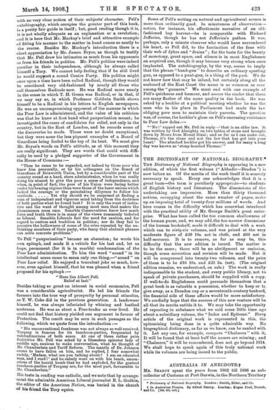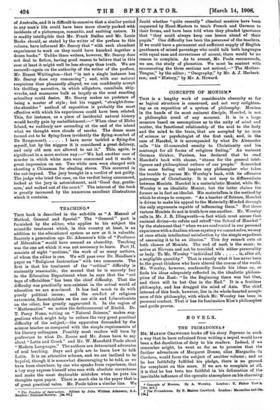AUSTRALIA IN ANECDOTE4
Mn. SEARCY spent the years from 1882 till 1896 as sub- collector of Customs at Port Darwin, in the Northern Territory • Dictionary of National Biography. London : Smith, Elder. and Co.
i• In Australian Tropics, By Alfred Searcy. London; Kogan Paul, Trenoh, sad Co. [wa. (id. net] of Australia, and it is difficult to conceive that a. similar period in any man's life could have been more closely packed with incidents of a picturesque, romantic, and exciting nature. It is readily intelligible that Mr. Frank Bullen and Mr. Louis Becke should, as stated by the writer of the preface to this volume, have informed Mr. Searcy that " with such abundant experiences to work on they could have knocked together a dozen books." Unlike these writers, however, Mr. Searcy &es not deal in fiction, having good reason to believe that in this case at least it might well be less strange than truth. We are assured—again on the authority of the writer of the preface, Mr. Ernest Whitington—that " in not a single instance has Mr. Searcy done any romancing" ; and, with our natural suspicions thus pleasantly allayed, we can confidently accept his thrilling narrative, in which alligators, cannibals, ship- wrecks, and massacres bulk as largely as the most exacting schoolboy could desire. Mr. Searcy makes no pretence of being a master of style ; but his rugged, " straight-from- the-shoulder " method of exposition is probably the most effective with which his experiences could have been related. This, for instance, as a piece of incidental natural history would hardly gain by embellishment :—" When clear of Elcho Island, we suddenly saw ascending at the end of the island what we thought were clouds of smoke. The dense mass turned out to be flying-foxes (evidently the flying-wombat of
De Rougemont) I have never tackled a flying-fox myself, but by the niggers it is considered a great delicacy, and only old men are allowed to eat it." This, again, is significant in a more serious way :—" We had another case of murder in which white men were concerned and it made a great impression on me. Two white men were charged with shooting a Chinaman for stealing stores. This occurred in the out-beyond. The jury brought in a verdict of not guilty. The judge who tried the case, on the verdict being announced, looked at the jury in astonishment, said ' Good day, gentle- men,' and walked out of the court." The interest of the book is greatly increased by the numerous excellent illustrations which it contains.











































 Previous page
Previous page